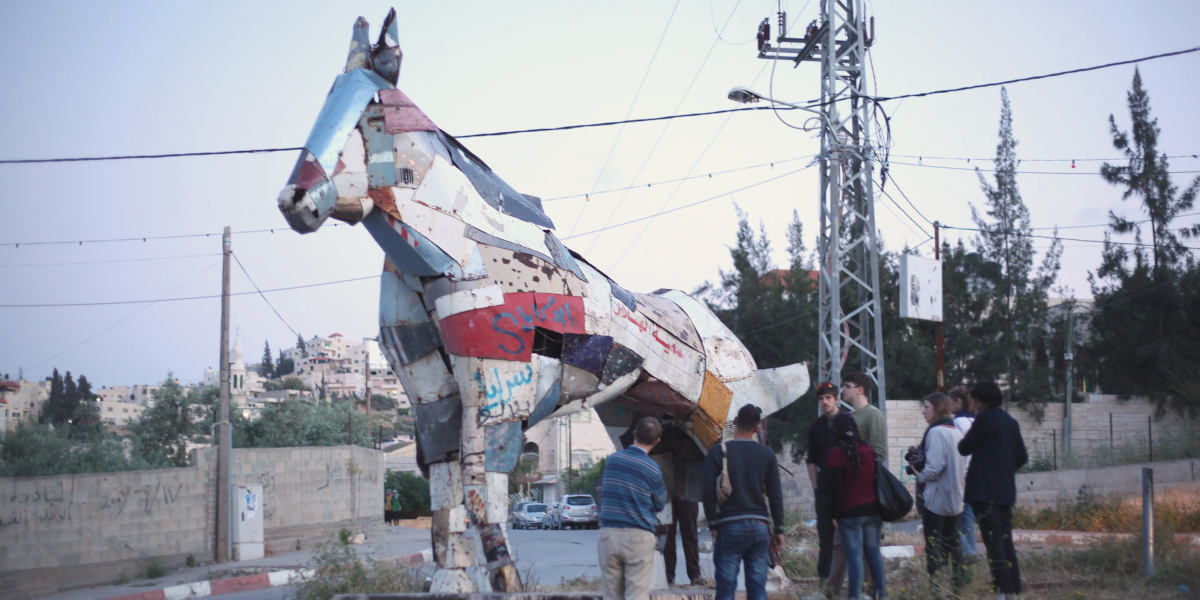In summer 2022, I wrote here about Russia’s co-option of cultural institutions in Ukraine. That ongoing war effort seeks in part to re-write ‘official’ histories through seizure of artefacts and museums. In Palestine, Israel’s bombs seek obliteration.
Amid the wreckage of homes, hospitals and schools, there also lie craters, rubble and bodies where arts centres, music halls, theatres, monuments and libraries used to stand.
Processes of dehumanisation demand erasure of people’s ability to create – our uniquely human will to imagine, make and value beautiful things. To artfully express our thoughts, hopes, history and pain.
In late October, Israeli soldiers made time during a raid on Jenin refugee camp in the West Bank to tear down an iconic 16-foot tall sculpture known as The Horse.
It was constructed in 2003 by Thomas Kilper with the help of local children, forged out of debris from a 2002 Israeli offensive that killed 52 people. Its central panels came from an ambulance, splintered by strikes that killed a doctor inside.
Silenced voices
Attempts to silence Palestinian voices and obscure memories of violence have vaulted border walls, seeped through airwaves and printed press, infected cultural institutions worldwide.
Frankfurt Book Fair dropped an award ceremony honouring novelist Adania Shibli. Royal Ontario Museum ordered Sameerah Hosam Ahmad and Malak Kanan to censor their work (only relenting 18 hours into an artists’ sit-in).
Artforum fired editor-in-chief David Valesco for expressing solidarity with Palestine. A Paris suburb shelved The Freedom Theatre troupe from Jenin. Southwark Cathedral called off the tenth anniversary concert of PalMusic UK. Some organisers noted ‘heightened sensitivities’. Others cited ‘safety fears’. The silences sounded the same.
Attempts to silence Palestinian voices have vaulted border walls to infect cultural institutions worldwide
In Gaza, an unknowable number of artists have been killed by bombardment, blockade and their effects, alongside thousands who knew their work. Among them, Hib Abu Nada, Heba Zagout and Mohammed Sami Qariqa kept drawing, filming, writing and posting until they died.
Their work echoes decades of literature, art, music, theatre and film that has celebrated cultural traditions while narrating a story the world hears but refuses to heed: Palestinian life is being destroyed.
A discerning eye
Documentation of atrocity is essential for justice to be served, and documentation of resistance is essential for maintaining struggles to that end. Argentinean and Chilean survivors of violent state oppression underscore these facts – and highlight the dangers of looking away or trying to forget.
Looking demands a discerning eye: social media feeds can cut through efforts to silence, but are spliced from every angle with conspiracy, distortion and lies. Justice is not achieved through hate. Word of mouth can be a deadly propaganda machine.
Dictatorship survivor Alejandra Naftal reminds us that looking, even discerningly, is not enough. She calls herself ‘a lifelong witness’. The translation does disservice to her words: testigos (witnesses) do not just see – they testify. That is the work of the artist, too, and it is the threat they pose, indefatigably, to power.
In Jenin, the soldiers who tore down The Horse also stole its remains. The fresh debris they created will be enough to build a hundred more.











